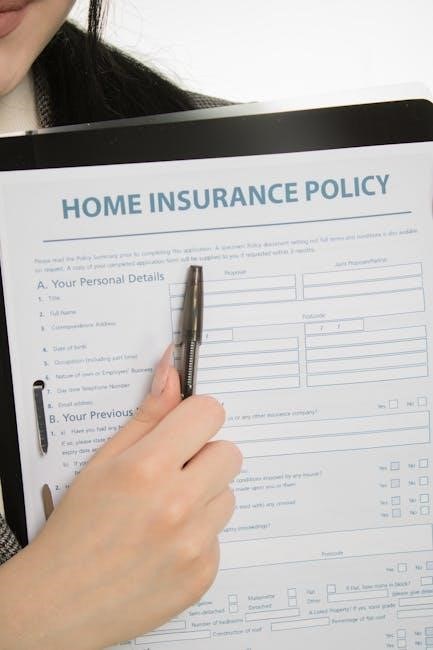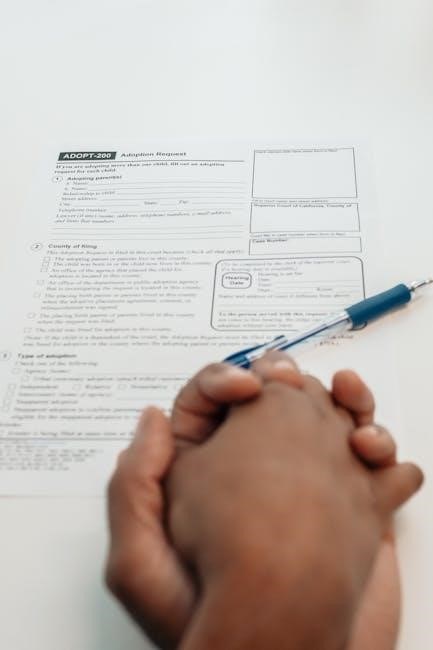The rental application process in New York is a streamlined system designed to help landlords and tenants find the perfect match efficiently․ It ensures a fair and transparent way to assess potential tenants while providing applicants with clear guidelines to showcase their eligibility․ This process is essential for both parties, as it establishes trust and sets the foundation for a smooth tenancy experience;
1․1 Understanding the Importance of a Rental Application Form
A rental application form is a critical document in the New York rental process, serving as the foundation for evaluating potential tenants․ It provides landlords or property managers with essential information to assess an applicant’s eligibility, ensuring a fair and transparent selection process․ The form typically includes details about employment, income, rental history, and creditworthiness, which help landlords determine if an applicant can meet the financial obligations of the lease․ In New York’s competitive rental market, a well-structured application form is vital for standing out among numerous applicants․ It also protects both parties by establishing clear expectations and complying with legal standards․ By requiring accurate and comprehensive information, the rental application form ensures that landlords can make informed decisions while tenants demonstrate their reliability and responsibility․ This step is fundamental to initiating a successful tenancy relationship in New York City․
1․2 Overview of the Rental Application Process in NYC
The rental application process in New York City is a structured and competitive procedure designed to streamline tenant selection․ It typically begins with prospective tenants locating a property and obtaining the application form, either online or in person․ Applicants must provide detailed personal, financial, and rental history information, along with supporting documents such as proof of income, employment verification, and credit reports․ Many landlords or property managers also conduct background and credit checks to assess an applicant’s reliability․ Once the application is submitted, along with any required fees, the landlord reviews the information to determine the applicant’s suitability․ This process ensures a fair evaluation of all candidates while helping landlords identify the most qualified tenant for their property․ In New York’s fast-paced rental market, a well-prepared application is crucial for securing a desired unit․

Required Documents for a Rental Application in New York
A rental application in New York typically requires a photo ID, proof of income, employment verification, rental history, and credit reports to assess eligibility for tenancy effectively․
2․1 Photo ID and Proof of Identity
A valid photo ID and proof of identity are essential components of a rental application in New York․ These documents confirm that you are who you claim to be, ensuring the landlord can trust the information provided․ Commonly accepted forms of identification include a driver’s license, passport, state ID, or visa․ These documents verify your legal status and age, which are critical for processing your application․ Additionally, proof of identity helps landlords conduct background checks and confirms your eligibility to rent․ It’s important to ensure your ID is not expired, as this could delay the application process․ Providing clear, legible copies of these documents is crucial for a smooth review․ Without proper identification, landlords may hesitate to move forward with your application, making it harder to secure your desired property․ Always have multiple forms of ID ready to meet the requirements․
2․2 Proof of Employment and Income
Proof of employment and income is a critical part of the rental application process in New York․ Landlords require this documentation to assess your financial stability and ability to pay rent consistently․ Commonly requested documents include recent pay stubs, a letter from your employer verifying your position and salary, or a W-2 form․ Self-employed individuals may need to provide tax returns or bank statements to demonstrate steady income․ These documents help landlords evaluate whether your income meets the rental criteria, often requiring tenants to earn at least three times the monthly rent․ Providing clear and up-to-date proof of employment and income strengthens your application and shows responsibility․ Ensuring all financial information is accurate and complete is essential for a smooth approval process․ Without adequate proof, landlords may hesitate to approve your application, delaying your move-in․
2․3 Rental History and References
Rental history and references are vital components of a rental application in New York, providing landlords with insights into your reliability as a tenant․ A rental history typically includes the names and contact information of previous landlords, along with the duration of your tenancy and the reason for leaving․ This helps landlords assess your track record of paying rent on time and maintaining a property․ Additionally, personal or professional references, such as from employers or colleagues, can reinforce your credibility․ Landlords may contact these references to verify your character and responsibility․ Including detailed rental history and strong references demonstrates your commitment to being a trustworthy tenant․ Ensure all information is accurate, as discrepancies could raise concerns․ A positive rental history and solid references significantly strengthen your application, making it more likely to stand out in a competitive market․
2․4 Credit Score and Financial Information
A credit score and financial information are critical components of a rental application in New York, as they demonstrate your ability to manage payments responsibly․ Landlords typically require a credit check to assess your financial stability and history of debt repayment․ A good credit score, often 700 or higher, is generally preferred in competitive markets like NYC․ Alongside your credit score, you may need to provide bank statements, tax returns, or other financial documents to verify your income and savings․ A strong financial profile can significantly improve your chances of approval․ It’s essential to ensure your credit report is accurate and address any issues beforehand․ Landlords may also consider factors like debt-to-income ratio and employment stability․ Providing thorough financial information helps build trust and demonstrates your readiness to meet rental obligations․
The Rental Application Form: Step-by-Step Guide
Obtaining the form, filling it accurately, and submitting with required fees are key steps in the rental application process in New York, ensuring a smooth experience for applicants․
3․1 Obtaining the Rental Application Form
Obtaining a rental application form in New York is typically straightforward․ Many landlords and property managers provide forms either online or in-person․ Applicants can download them from property websites or pick them up at the rental office․ Some real estate agencies also offer standardized forms that can be completed digitally, making the process more convenient․ It’s essential to ensure the form is specific to the property and complies with New York housing laws․ Additionally, some online platforms allow tenants to access and submit applications directly through their websites․ Always verify the form’s authenticity and completeness before proceeding to fill it out․ This step is crucial as it sets the stage for a smooth and efficient application process․
3․2 Filling Out the Form Accurately
Filling out a rental application form in New York requires precision and honesty․ Applicants must provide accurate personal, employment, and rental history details․ Ensure all sections are completed thoroughly, as incomplete forms may delay processing or result in rejection․ Use proper formatting and capitalization for names, addresses, and dates․ Be truthful about income, credit history, and previous landlords, as these will be verified during background checks․ Double-check for spelling and grammatical errors to make a positive impression․ Attach any additional required documents, such as pay stubs or references, to avoid follow-up requests․ Taking the time to fill out the form meticulously demonstrates responsibility and increases the likelihood of approval․ Accuracy is key to a smooth and successful application process․
3․3 Submitting the Application and Required Fees
Once the rental application form is completed, the next step is to submit it along with the required fees․ These fees typically cover the cost of background and credit checks, and they vary depending on the landlord or property management company․ Ensure all documents, such as proof of income, rental history, and identification, are attached to avoid delays․ Payment methods may include credit cards, checks, or online transfers, so confirm the accepted options in advance․ After submission, allow time for processing, which usually takes a few business days․ Follow up politely with the landlord or agent to confirm receipt and inquire about the status․ Timely submission and payment demonstrate professionalism and enthusiasm for the property․ Remember to keep a record of your application and payment for future reference․ This step is crucial in securing your desired rental property․

Background and Credit Checks in New York Rentals
Background and credit checks are essential in New York rentals to assess a tenant’s reliability․ They evaluate creditworthiness, payment history, and criminal records, aiding landlords in making informed decisions․
Background checks are a critical component of the rental application process in New York, allowing landlords to assess potential tenants’ reliability and suitability․ These checks typically include a review of criminal history, ensuring no serious offenses that could pose risks․ Additionally, they may examine rental history to identify past evictions or violations․ Credit checks are also conducted to evaluate financial stability, though they focus more on payment history and creditworthiness rather than the score itself․ Landlords use this information to determine if an applicant is likely to pay rent on time and maintain the property responsibly․ It’s important for applicants to be transparent about their past, as any discrepancies can lead to rejection․ Understanding the scope of these checks helps tenants prepare necessary documentation and address any concerns proactively․ This process ultimately protects both parties by fostering a trustworthy tenancy relationship․ Credit scores play a significant role in determining eligibility for rental properties in New York․ Most landlords require applicants to have a credit score of at least 700, though this can vary depending on the property and the landlord’s criteria․ A higher credit score demonstrates financial stability and increases the likelihood of approval․ Applicants with scores below 700 may still be considered, but they might need to provide additional assurances, such as a larger security deposit or a co-signer with a strong credit profile․ It’s important to note that credit history is thoroughly reviewed, with particular attention to payment history, debt levels, and any past bankruptcies or foreclosures․ A poor credit history could result in rejection, while a strong one can negotiate better terms․ Understanding these requirements helps applicants prepare and improve their chances of securing their desired rental property․ Preparing for a credit check is crucial to ensure a smooth rental application process in New York․ Start by reviewing your credit report to identify and correct any errors or inaccuracies․ Pay down high balances to improve your debt-to-income ratio, as this can positively impact your credit score․ Avoid opening new lines of credit or making large purchases, as these can temporarily lower your score․ Gather proof of income and employment to demonstrate financial stability․ If you have past credit issues, consider writing a brief explanation to provide context․ Finally, be transparent with your landlord or property manager about your financial situation, as this can help build trust․ By taking these steps, you can present yourself as a responsible and reliable tenant, increasing your chances of approval․ Proper preparation ensures you’re ready for the credit check and strengthens your rental application․ To make your rental application stand out in New York, ensure all documents are complete and organized․ Highlight your stable employment, good credit score, and positive references․ A well-written cover letter emphasizing your reliability can also make a strong impression, helping you secure your desired property efficiently․ Being prepared with all necessary documents is crucial to streamline your rental application process in New York․ Gather essential items such as a valid photo ID, proof of employment, recent pay stubs, and bank statements to demonstrate financial stability․ Include rental history with positive references from previous landlords or property managers․ A good credit score is also important, so ensure you have documentation ready to showcase your financial health․ Additionally, prepare a cover letter highlighting your reliability and responsibility as a tenant․ Having all these documents organized and easily accessible will not only speed up the process but also make a positive impression on the landlord or rental agency․ This preparation shows initiative and professionalism, increasing your chances of securing the property you desire․ A well-crafted cover letter can significantly enhance your rental application in New York․ It serves as an opportunity to personally connect with the landlord or property manager, showcasing your qualities beyond the documents․ Begin by introducing yourself and expressing enthusiasm for the property․ Highlight your stability, such as a steady job, good credit score, and positive rental history․ Mention how the property aligns with your needs and lifestyle․ Keep the tone professional yet personable, ensuring proper grammar and spelling․ Avoid generic phrases and tailor the letter to the specific property․ A compelling cover letter demonstrates initiative and responsibility, making your application stand out in a competitive market․ It’s a chance to tell your story and explain why you’re the ideal tenant for the space․ Following up on your rental application is a crucial step that demonstrates your enthusiasm and professionalism․ After submitting your application, wait a few days to allow the landlord or property manager time to review it․ A polite phone call or email can help keep you top of mind․ When following up, be concise and express your continued interest in the property․ For example, you might say, “I hope you’re doing well; I wanted to follow up on my rental application for [property address] and confirm that all materials were received․” This approach shows initiative without being overly aggressive․ Additionally, if you haven’t heard back within a week, it’s appropriate to send a brief reminder․ Remember to stay courteous and professional throughout the process․ Persistent yet respectful follow-ups can make a positive impression and keep your application on track․ New York tenants enjoy strong legal protections under state and city laws, ensuring fair housing practices and clear lease agreements․ Understanding these rights is essential for a secure tenancy․
Tenants in New York are protected by robust legal frameworks that safeguard their rights․ These protections include fair housing laws, which prohibit discrimination based on race, gender, religion, or other factors․ Additionally, tenants are entitled to a habitable living environment, requiring landlords to maintain safe and sanitary conditions․ Renters are also shielded from unjust evictions, with specific legal procedures that must be followed․ Furthermore, tenants have the right to privacy, with restrictions on how and when landlords can enter the rental property․ These protections ensure that tenants can live securely and without fear of unfair treatment, making New York a tenant-friendly state with clear guidelines for both landlords and renters․ Understanding these rights is crucial for navigating the rental application process and tenancy with confidence․ New York City enforces strict fair housing laws to prevent discrimination in rental practices․ These laws prohibit landlords and property managers from denying housing based on race, color, religion, gender, sexual orientation, disability, national origin, age, or marital status․ The New York City Human Rights Law and the federal Fair Housing Act ensure equal access to housing opportunities for all applicants․ Tenants are protected from discriminatory practices in advertisements, application processes, and tenant selection; Violations of these laws can result in legal consequences for landlords․ Additionally, these laws require landlords to make reasonable accommodations for individuals with disabilities․ Understanding these protections is vital for tenants to recognize and address any unfair treatment during the rental application process․ These laws foster a fair and inclusive housing market in NYC, ensuring everyone has an equal chance to secure a home․ A lease agreement is a legally binding contract between a tenant and landlord that outlines the terms and conditions of the tenancy․ In New York, lease agreements typically include the duration of the rental, rent amount, payment terms, and responsibilities of both parties․ Tenants should carefully review the lease to ensure they understand all clauses, including policies on pets, subletting, and repairs․ The lease also specifies the rights and obligations of both parties, such as timely rent payments and property maintenance․ It’s crucial to ask for clarification on any unclear terms before signing․ Once signed, the lease is enforceable under New York housing laws, providing a framework for resolving disputes․ Understanding the lease agreement is essential for a smooth and lawful tenancy experience in NYC․ Always read the document thoroughly and consider seeking legal advice if needed․ Understanding the rental application process in New York is crucial for a smooth tenancy experience․ Being prepared with the right documents and knowledge ensures a successful outcome for tenants․ To ensure a successful rental application in New York, stay organized and proactive; Gather all necessary documents in advance, including proof of identity, employment, and rental history․ Double-check the application form for accuracy and completeness to avoid delays․ Consider writing a cover letter to highlight your strengths as a tenant, such as stability, reliability, and cleanliness․ Follow up with the landlord or property manager to express your continued interest and inquire about the status of your application․ A positive attitude and professionalism can make a lasting impression․ Additionally, be prepared to act quickly if approved, as the competitive New York rental market moves fast․ By being thorough, timely, and transparent, you can increase your chances of securing your ideal rental property․ Remember, preparation and persistence are key to standing out in a crowded applicant pool․4;1 Understanding Background Checks
4․2 Credit Score Requirements for Rentals
4․3 How to Prepare for a Credit Check

Tips for Making Your Rental Application Stand Out
5․1 Being Prepared with All Necessary Documents
5․2 Writing a Compelling Cover Letter
5․3 Following Up on Your Application

Legal Considerations for Tenants in New York
6․1 Tenant Rights and Protections
6․2 Fair Housing Laws in NYC
6․3 Understanding Lease Agreements
7․1 Final Tips for a Successful Rental Application
